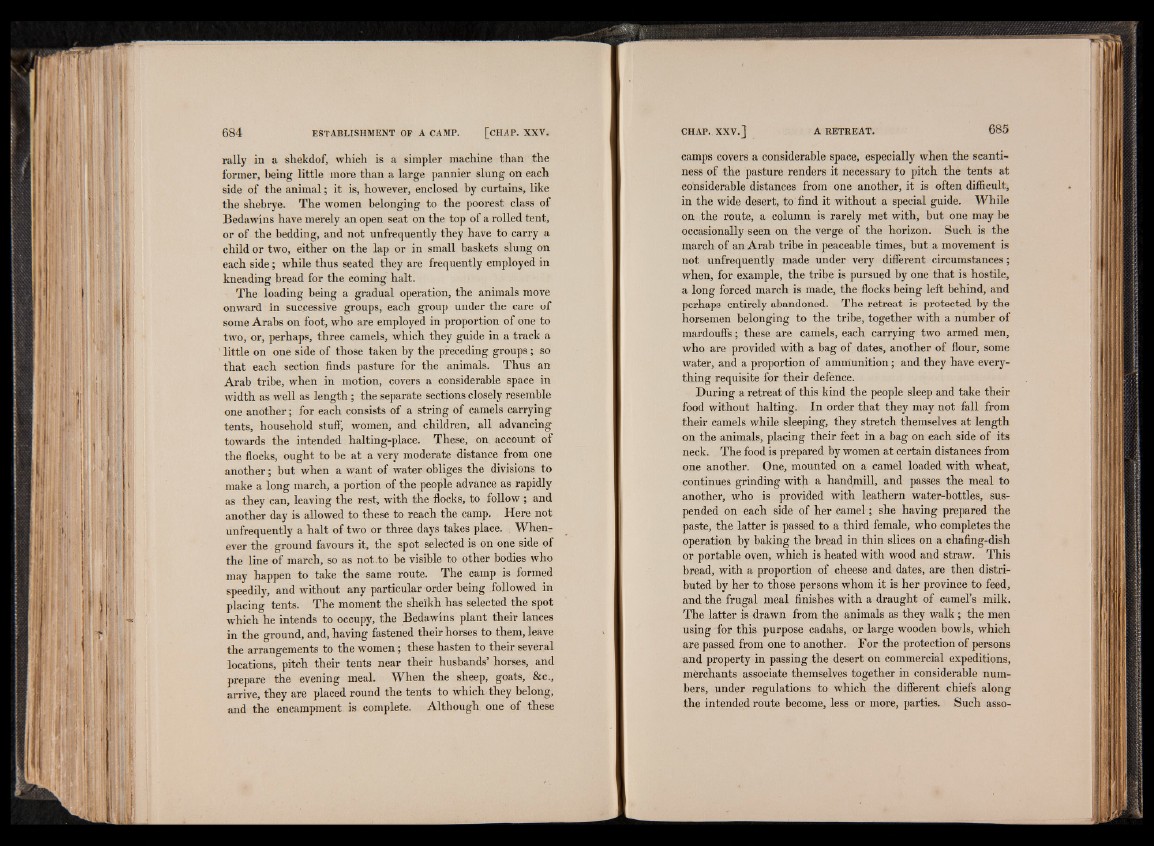
rally in a shekdof, which is a simpler machine than the
former, being little more than a large pannier slung on each
side of the animal; it is, however, enclosed by curtains, like
the shebrye. The women belonging to the poorest class of
Bedawins have merely an open seat on the top of a rolled tent,
or of the bedding, and not unfrequently they have to carry a
child or two, either on the lap or in small baskets slung on
each side; while thus seated they are frequently employed in
kneading bread for the coming halt.
The loading being a gradual operation, the animals move
onward in successive groups, each group under the care of
some Arabs on foot, who are employed in proportion of one to
two, or, perhaps, three camels, which they guide in a track a
little on one side of those taken by the preceding groups; so
that each section finds pasture for the animals. Thus an
Arab tribe, when in motion, covers a considerable space in
width as well as length; the separate sections closely resemble
one another; for each consists of a string of camels carrying
tents, household stuff, women, and children, all advancing
towards the intended halting-place. These, on. account of
the flocks, ought to be at a very moderate distance from one
another; but when a want of water obliges the divisions to
make a long march, a portion of the people advance as rapidly
as they can, leaving the rest, with the flocks, to follow ; and
another day is allowed to these to reach the camp. Here not
unfrequently a halt of two or three days takes place. Whenever
the ground favours it, the spot selected is on one side of
the line of march, so as not .to be visible to other bodies who
may happen to take the same route. The camp is formed
speedily, and without any particular order being followed in
placing tents. The moment the sheikh has selected the spot
which he intends to occupy, the Bedawins plant their lances
in the ground, and, having fastened their horses to them, leave
the arrangements to the women; these hasten to their several
locations, pitch their tents near their husbands’ horses, and
prepare the evening meal. When the sheep, goats, &c.,
arrive, they are placed round the tents to which they belong,
and the encampment is complete. Although one of these
camps covers a considerable space, especially when the scantiness
of the pasture renders it necessary to pitch the tents at
considerable distances from one another, it is often difficult,
in the wide desert, to find it without a special guide. While
on the route, a column is rarely met with, but one may be
occasionally seen on the verge of the horizon. Such is the
march of an Arab tribe in peaceable times, but a movement is
not unfrequently made under very different circumstances;
when, for example, the tribe is pursued by one that is hostile,
a long forced march is made, the flocks being left behind, and
perhaps entirely abandoned. The retreat is protected by the
horsemen belonging to the tribe, together with a number of
mardouffs; these are camels, each carrying two armed men,
who are provided with a bag of dates, another of flour, some
water, and a proportion of ammunition; and they have everything
requisite for their defence.
During a retreat of this kind the people sleep and take their
food without halting. In order that they may not fall from
their camels while sleeping, they stretch themselves at length
on the animals, placing their feet in a bag on each side of its
neck. The food is prepared by women at certain distances from
one another. One, mounted on a camel loaded with wheat,
continues grinding with a handmill, and passes the meal to
another, who is provided with leathern water-bottles, suspended
on each side of her camel; she having prepared the
paste, the latter is passed to a third female, who completes the
operation by baking the bread in thin slices on a chafing-dish
or portable oven, which is heated with wood and straw. This
bread, with a proportion of cheese and dates, are then distributed
by her to those persons whom it is her province to feed,
and the frugal meal finishes with a draught of camel’s milk.
The latter is drawn from the animals as they walk ; the men
using for this purpose cadahs, or large wooden bowls, which
are passed from one to another. For the protection of persons
and property in passing the desert on commercial expeditions,
merchants associate themselves together in considerable numbers,
under regulations to which the different chiefs along
the intended route become, less or more, parties. Such asso